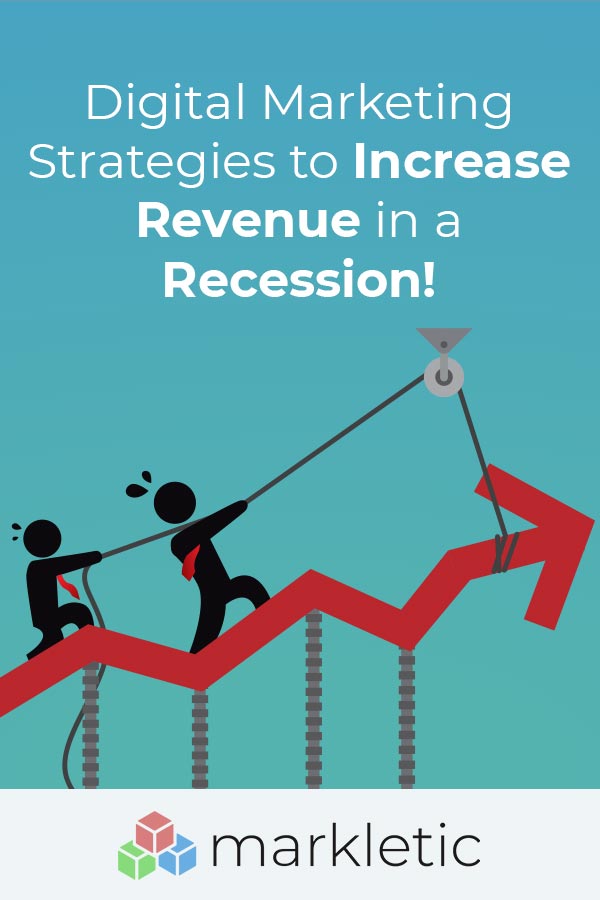6 Digital Marketing Strategies to Increase Revenue in a Recession

Table of Contents
Marketing in a recession is challenging for organizations of all sizes. However, it also comes with a lot of opportunities to drive business growth. The right digital marketing strategies during an economic downturn will set you apart from the competition. You are here to win, so let’s focus on digital marketing strategies that will increase revenue in a recession.
Oftentimes companies will cut marketing budgets during a recession. Cutting the marketing budget during a recession will also result in fewer leads. Consequently, this will also mean that your company will generate less revenue.
It’s understandable that companies cut marketing budgets though. For many companies it’s a time of fear and uncertainty. People are rushed into decisions and that often results in the wrong decisions being made.
If you want to come out of a recession victorious, you need to be making intelligent decisions. Chances are that many companies are reducing their marketing spend. This presents a great opportunity for your company to acquire leads at a discounted price. You need to take advantage of this opportunity!
Digital marketing in a recession will generate you the leads you need to ensure business continuity. It will provide you the leads and the sales pipeline. It will also improve the level of confidence that buyers have in your company. If you improve market share during a recession, it tells buyers that your solution or product is there to stay.
So let’s have a look at some digital marketing strategies that you can implement starting today to increase revenue.
1. Set up virtual events
An integral lead generation tactic in B2B marketing is to attend events. This allows your sales team to build personal relationships with your prospective customers.
The use of event marketing in your demand generation strategy will speed up sales cycles. This is something not to be overlooked as it can take many months to close deals in B2B markets.
However, during a recession, it can be harder to justify the investment of attending expensive trade shows.
A great alternative to in-person events is through hosting virtual events and conferences. Especially, if you are hosting B2B events yourself. There are many virtual conference platforms available on the market.
However, for it to be successful, you will need the right virtual conference platform and the right technical equipment, such as a good microphone. This is my recommendation for a great and cost-effective microphone.
This demand generation strategy is so important in a recession that I’ve written an article about how to set up your virtual conferences. Here are all the things you need to host virtual events successfully.
It must be noted that the most value of in-person events comes from the ability to network. The great news is that if you set virtual events up properly, that you will still have the ability to network with your prospects during an event.
Virtual events are cost-effective; they’re not expensive to set up. Imagine the venue costs that you will save. You can use this money to increase the level of engagement of your audience.
I’ve set up many executive round tables virtually. I sent the C-level people dinner for their families and this was greatly appreciated. There is a lot of untapped potential when it comes to virtual events.
Digital marketing in a recession means that you have to be resourceful. Be innovative and make virtual events work!
2. Increase programmatic advertising spend
Many companies will reduce their advertising spend during a recession. This is something that I’ve highlighted in a recent article about how marketing is affected by a recession.
As I’ve highlighted in that post, companies should do the exact opposite. During a recession, the budget that you devote to advertising should increase.
Think about it. Many companies will reduce their advertising spend. This means that you can reach more people for a lower price. However, it doesn’t mean that you should blindly increase your advertising spend.
You need to be more targeted. You only need to present ads to prospective customers who have a high propensity to buy.
This is where programmatic advertising comes into play. With programmatic advertising, you can be highly targeted and only present advertisements to relevant audiences.
You can even integrate it with your CRM. Let’s say your sales team just created a new opportunity at a key prospect. With programmatic advertising, you can automatically start showing ads to these people.
Even better, you can show a different set of advertisements depending on where they are in the sales cycle. Of course, if prospects are at an advanced stage in your sales cycle, you want to show a different set of ads such as ROI calculations.
Digital marketing in a recession means not blindly spending money on irrelevant things. With programmatic advertising, you can show highly targeted and cost-effective advertising to the right people.
Your sales team will love you for it.
3. Optimize your email marketing campaigns
Email marketing is a very cost-effective strategy to convert leads to sales cycles. It’s unfortunate that many companies take email subscriptions for granted.
They blast their email subscribers with content that is not relevant to them. Also, companies try to throw mud at the wall to see what sticks.
Stop doing this. Your opted-in email database is incredibly valuable. You’ve spent a lot of marketing budget to grow your email list.
If you are not providing these people with value then they will unsubscribe before you know it. Avoid this at all times.
You should be optimizing your email marketing campaigns. Only send emails when it brings a lot of value to your audience. Walk a few miles in their shoes.
What do you do when you receive an email with no value? That’s right, you’ll delete it without even reading it. Other people do the same, so take this into consideration.
You need to optimize your email nurture programs. Send emails depending on where they are in the sales cycles. Create dynamic emails based on their personas and send verticalized emails. People in the finance industry don’t want to see what companies in healthcare did with your product or service.
Your email marketing strategies should be optimized irrespective of a recession. However, digital marketing in a recession means that you need to make more use of the tools that you have. So start optimizing your email campaigns today and you’ll convert more leads into opportunities during a recession.
4. Increase your output of value-based content
With marketing in a recession, you need to take into consideration that the consumer confidence declines. Companies are less likely to make large purchases unless you can prove your product or service adds incredible value.
There are some digital marketing strategies in a recession that you can implement to increase the level of trust that companies have in your brand.
First and foremost, you need to increase your output of value-based content. You can think of things such as:
- Customer success stories;
- Industry-specific landing pages;
- ROI calculations and case studies;
- Joint webinars with customers;
When you have produced this content, you can now use it in your digital marketing campaigns.
With value-based marketing, you focus on delivering value for your prospective customers. Oftentimes at SaaS companies, marketers talk about features. This is called feature-based marketing.
However, there are some significant benefits to value-based marketing such as:
- Larger deal sizes;
- Increased levels of trust;
- Faster sales cycles.
With every digital marketing campaign in a recession, start by thinking: “what’s in it for them”?
Put yourself in the shoes of your audience and think of messages that will be valuable for them.
As an example, let’s say you are working for a low-code vendor. Below are 2 examples of messages. One is feature-driven and one is value-based.
- Feature-based: Develop faster through the use of microservices!
- Value-based: Bring your ideas to market faster and start innovating today.
These are just examples, but you’ll understand that option 2 will convert better.
5. Layer content syndication in with intent-based marketing
A prominent lead generation strategy in B2B marketing is content syndication. It’s quite an easy way to drive a large quantity of leads.
The benefit of content syndication is that you can generate leads in your named account list. Account-based marketing will even become more important in a recession.
However, content syndication leads are often quite cold. Even if you agree on qualification questions with your content syndication vendor.
The good news is that there is a very powerful way to do content syndication more effectively.
There are some ABM vendors such as MRP that integrate intent-based marketing and content syndication.
Intent-based marketing looks at the behaviors of your target audience on external websites. As an example, you will have data on what a particular account is researching. Let’s say one of your prospective customers is researching your competitors. This means they are probably in the market for your solution.
You can use this data to proactively generate leads that are researching particular topics that you are interested in.
So let’s say you want to generate leads from companies who are researching ERP systems. By layering in content syndication with intent-based marketing, you can narrow down your target list. This means that the leads generated will have a larger propensity to buy.
With digital marketing in a recession, you need to make the most use of your budget. Combining content syndication with intent-based marketing will result in higher-quality leads for the same budget.
6. Build authority and trust through customer success stories
Digital marketing in a recession must include customer success stories extensively. The need to build trust in a recession is enormous.
In B2B marketing, writing customer success stories is a best practice in general. However, B2B demand generation teams are often not fully milking these stories.
Customer success stories should not be taken for granted. They are an incredible tool to convince your prospective customers to consider your product.
In a recession, you need to think outside the box. So, when you’ve gone through all the effort of writing a customer success story, why stop there?
These stories should play a very promotional role in demand generation strategies.
When people from a certain industry visit your website, make sure your chatbot shows a relevant customer success story from the same industry.
Use customer success stories in your programmatic advertising strategies. A great time to show customer success stories is when an account is at the top-of-the-funnel.
When an account is lower in the funnel, show them Return on Investment statistics from customers in the same industry.
The goal is to build authority and to gain the trust of your prospective customers. If you are able to really build brand ambassadors, you can even do reference calls with your happy customers and prospects.
Did you know that you can check your domain authority through Semrush? This tells you how much search engines such as Google trust your website. The higher the domain authority, the more leads you will generate during a recession.
Digital marketing in a recession will provide you loads of opportunities to drive massive demand. However, you need to start optimizing your campaigns and construct intelligent campaigns. Your marketing needs to be recession-proof!

Share this article




